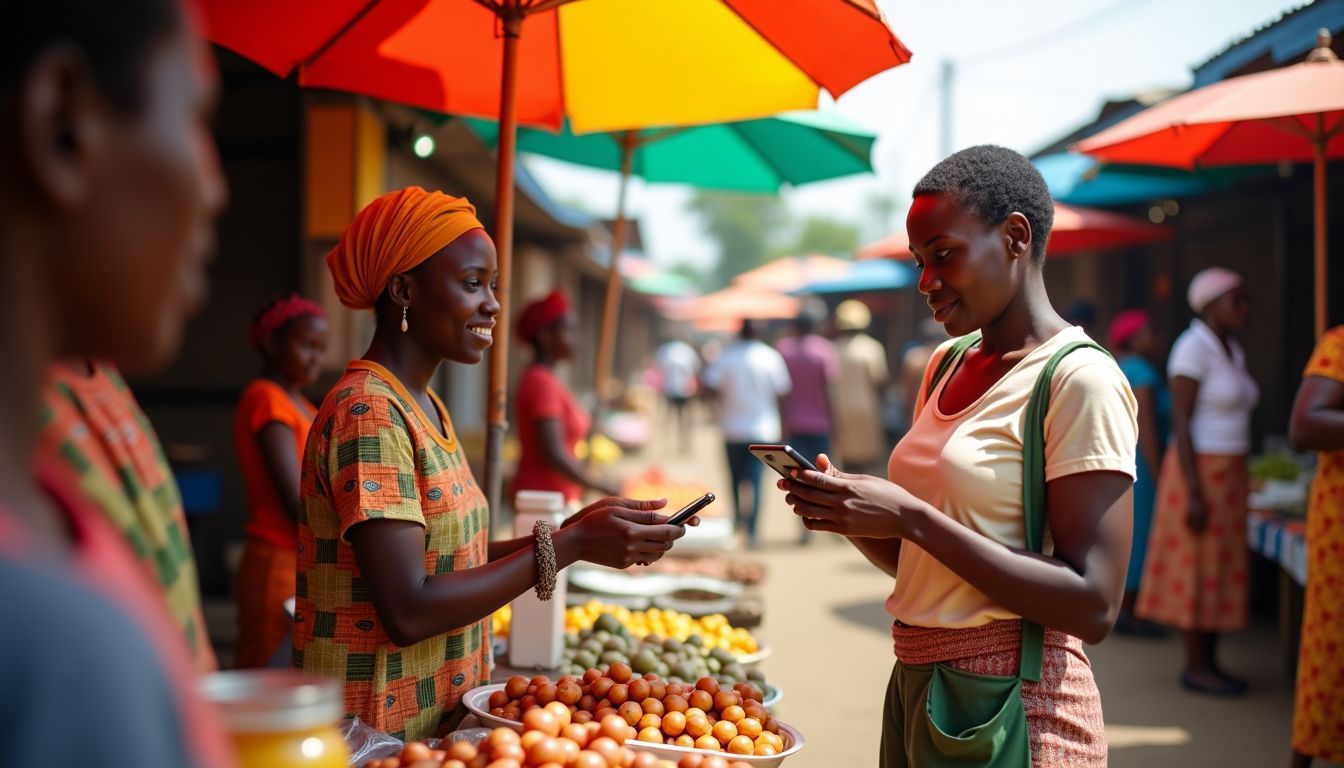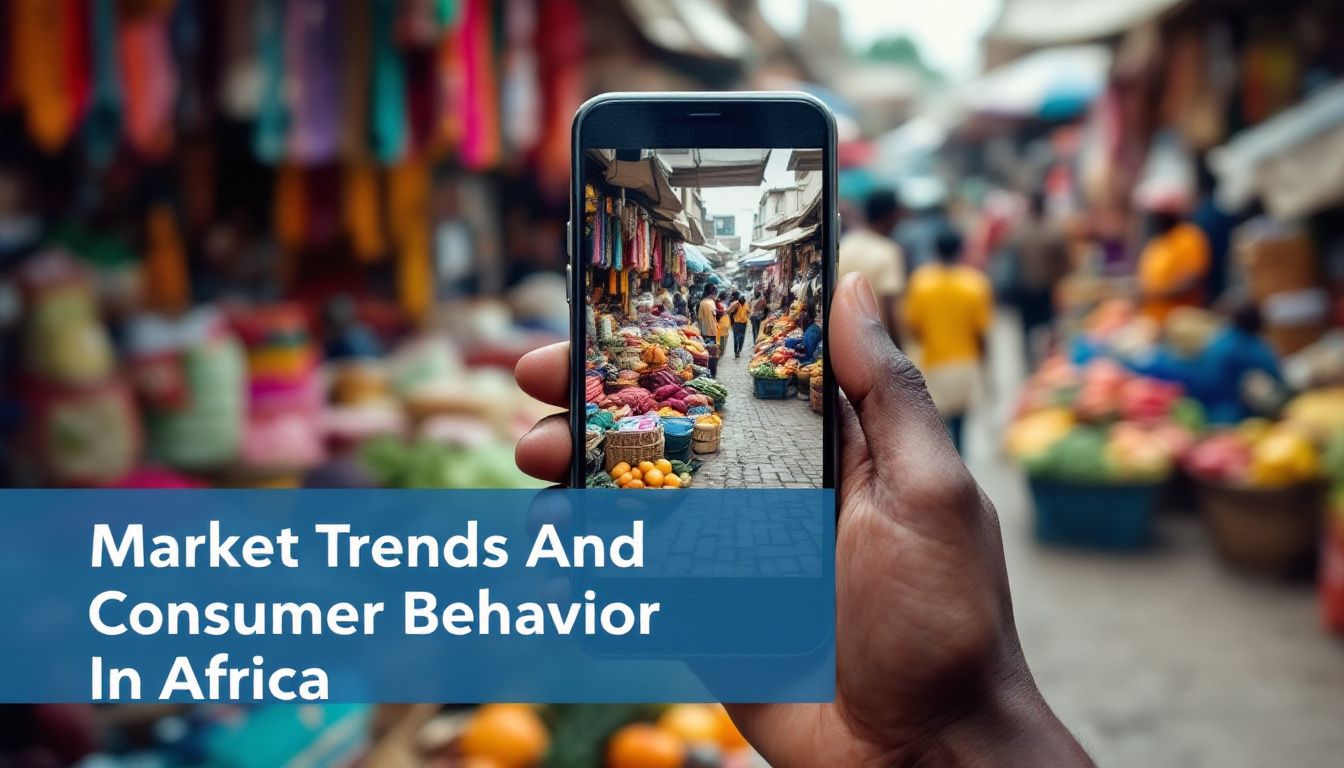Are you finding it tough to understand what African consumers truly want and how market changes affect their shopping habits? I’ve felt this challenge myself and decided to explore deeper.
I discovered that Africa’s growing middle class is tech-savvy and eager for new products. 1 In this post, I’ll share clear insights on key consumer behaviors and market shifts in Africa.
Keep reading—you’ll get a clearer picture of what’s driving spending across the continent today. 3
Key Takeaways
- Africa’s middle class is expanding quickly—shoppers now use mobile phones to check prices, hunt for bargains, and share deals.
- African e-commerce sits at around $29 billion today, but by 2025 it’ll jump to nearly $75 billion—Nigeria tops the chart already at $13 billion.
- Young buyers across Africa pick brands aligned with their personal values and those supporting the local area.
- Price is key for African consumers—they closely compare costs but still expect solid quality.
- Community opinions and personal recommendations influence African shoppers far more than traditional advertising.
Key Market Trends in Africa

Africa’s markets are changing fast, with new trends that excite me. I see big shifts in how people shop and what they want – from mobile banking growth to strong demand for local goods.
Rise of the Middle Class
I’ve seen Africa’s middle class steadily expand each year. This means more people now have money for things they couldn’t afford before—beyond the basics, like food and housing. Numbers clearly show the shift: customers increasingly go for quality and better services, not just cheaper goods.
Companies across the continent must now rethink how they market and sell. 1
Mobile phones strongly influence this shift. Shoppers regularly use phones to compare prices, shop online, and spot good deals. Young people—who make up most of Africa’s population—drive these shopping trends.
They prefer brands that match their lifestyle and personal values. Price, though, still matters a lot; even with extra money, people carefully look for good value. 2
Next, let’s see how digital platforms and online shopping shape African buying habits.
Growth of E-commerce and Digital Platforms
Online shopping in Africa has boomed over the past few years—it now stands at $29 billion and will hit around $75 billion by 2025. 3 Nigeria is way ahead, with a market of $13 billion, followed by Egypt at $4 billion, and Kenya close behind at $3 billion.
Internet use reaches about 60% of Africa’s population, meaning over 800 million people are connected. While visiting Lagos last year, I noticed how quickly people have taken to using mobile money apps for everyday shopping.
The COVID-19 pandemic pushed many to shop from home, changing buying habits for good. People now order electronics, clothing, or beauty products right from their couch. Mobile tech growth has made online shopping available even in areas with rough roads and no big shopping malls.
Payment services like Kenya’s M-Pesa help people without bank cards or accounts buy things easily. 4 A growing middle class with extra spending money creates huge opportunities—for both local brands and global companies looking to tap into Africa’s booming markets.
Demand for Local and Sustainable Products
I’ve spotted a big change lately in what African shoppers want. In Nigeria, Kenya, South Africa, and Ghana, people expect brands to show ethical behavior and genuine care. 5 My visits to local markets clearly reflect this view.
Young people, especially Gen Z and Millennials, prefer brands that reduce carbon footprints and give back to their communities. 6 And this push for responsible brands has caught on fast across Africa.
Local products are booming right now in the African retail market. In Uganda and Ethiopia, folks pay close attention to where food is grown, and how farmers grow it. Sales of eco-friendly items—like sustainable clothing and natural food products—are set to rise sharply. 5 I’ve noticed it myself in grocery stores; customers regularly read labels and openly ask about the stuff they buy. This trend connects directly to cultural pride, and people’s desire to boost local economies.
Factors Influencing Consumer Behavior in Africa
African shoppers make choices based on many factors beyond just price. These factors shape how people buy things and which brands they pick in the growing African market.
Price Sensitivity and Value-driven Purchasing
Price sensitivity drives nearly every purchase decision in markets across Africa right now. With inflation rising, shoppers—from lower income to upper class—keep a close eye on spending, especially for non-essential items. 1 On recent visits to Kenyan grocery stores, I noticed shoppers pulling out their phones, comparing prices carefully before choosing any item. This habit cuts through every social group, whether shopping at busy street markets or higher-end retail stores. 7
The expanding middle-class changes how people measure value. Shoppers no longer look for just low-priced goods—they demand products worth their money. Mobile phones make price-checking easy, pushing local brands and big international companies alike to rethink their approach to pricing.
Last time I was there, shoppers actively used loyalty cards and phone payment apps to stretch budgets, without giving up on quality. Economic pressure makes careful spending essential—it’s just smart shopping made simple. 1
Cultural and Community Influences
Culture strongly impacts shopping patterns across Africa. The continent’s vibrant mix of old traditions and modern lifestyles shapes how locals view brands. 1 From my research, local brands usually win customer loyalty, because they feel familiar and culturally connected.
International brands can succeed too—but only if they truly understand local tastes and adapt thoughtfully.
Advice from family and friends often matters more than costly ads. Africans really value community recommendations, making word-of-mouth especially powerful there. Urban shoppers willingly experiment with new products, often embracing global brands.
Rural communities generally prefer trusted local goods, choosing items helpful to the whole group.
Social media now rapidly amplifies these trusted community views. Tradition blends smoothly with digital networks, creating unique shopping patterns specific to Africa. 8 Shoppers remain mindful of costs, yet cultural connection usually determines product success across different African markets.
Conclusion
Africa’s markets move fast these days—especially with mobile money apps reshaping shopping habits everywhere. Young buyers often pick local brands, ones that reflect their values and fit their budgets.
Price is still king, though, especially since people strongly prefer good deals during hard times. Companies that really listen to African customers—offering fair prices, respecting local traditions, using tech wisely—stand to win big.
And as Africa’s middle class expands and cities keep growing, these shoppers will increasingly drive business success.
References
- ^ https://www.afsic.net/understanding-consumer-behavior-in-african-markets/
- ^ https://www.thehabarinetwork.com/navigating-africas-growing-middle-class-shifting-consumer-trends-and-opportunities
- ^ https://tremhost.com/blog/the-growth-of-e-commerce-in-africa-statistics-and-market-trends/
- ^ https://www.stattimes.com/ecommerce/e-commerce-in-africa-unlocking-new-paths-for-economic-growth-1354446 (2025-02-10)
- ^ https://www.linkedin.com/pulse/sustainability-market-research-how-brands-can-adapt-africa-7isle
- ^ https://www.euromonitor.com/article/top-three-global-consumer-trends-in-sub-saharan-africa
- ^ https://pages.prebodigital.co.za/price-sensitivity-trends-south-africa
- ^ https://www.researchgate.net/publication/309361416_The_Influence_of_National_Culture_on_Marketing_Strategies_in_Africa




